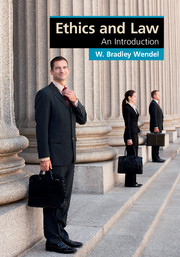Preface
Published online by Cambridge University Press: 05 October 2014
Summary
Preface
This book is about the ethical principles that govern the professional activities of lawyers and the relationship of lawyers’ ethics to two important normative domains: first, general moral considerations that apply to all of us, as moral agents; and second, to the law, with its characteristic ways of making and justifying demands on citizens of a society. In a modern, complex society in which people disagree about morality and justice, the law is an important source of social stability and solidarity. The law sets limits on what the government can do to its citizens and what citizens can do to each other. It gives people the right to establish the terms of relationships with others through contracts, wills, and trusts, and the form of various forms of property ownership. Criminal prosecutions and civil lawsuits provide a means for expressing collective disapproval of antisocial conduct and can empower far-reaching social change. But the law can also be an instrument of oppression, entrenching the privileges of powerful individuals and corporations and perpetuating injustices against marginalized individuals and groups. The law has protected the rights of slaveholders and established the principle of “separate but equal.” The law can be used to harass or impose costs on others, and, instead of contributing to social solidarity, it can create a sense of individualism and disputatiousness. The law is neither inherently good nor inherently bad but is instead a tool that can be used for good or bad ends.
- Type
- Chapter
- Information
- Ethics and LawAn Introduction, pp. vii - xPublisher: Cambridge University PressPrint publication year: 2014



